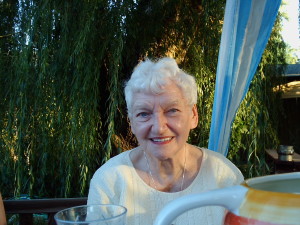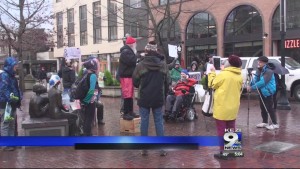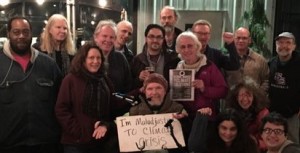October 10, 2015 World Mental Health Day

Mourning in Charleston, South Carolina after the racist shooting on June 17, 2015. Credit: USA Today.
In the wake of yet another national uproar about a mass shooting, much of the public once again turns its eye towards supposed mental health reform as the solution to the atrocity of acts of gun violence carried out in public spaces by primarily young, white men. The issue of gun control has soared back up to the top of concerns being addressed by presidential candidates, and national discourse has fallen back into its routine, polarized stances. The Republican leadership continues to suggest that gun control is not the solution — there must be something wrong with “those people’s” brains.
Leading Black mental health reform activists are warning us that the simplistic approach of more involuntary psychiatric drugging is inherently racist. To address the spiritual illness of violence in America we must confront the reality of racism in our media, institutions and lives.
Forced Psychiatric Drugging is Racist
Rep. Tim Murphy (R-PA) is proposing a huge and complex bill that would, among other disasters, expand what he calls “Assisted Outpatient Therapy.” Mental health rights advocates more accurately refer to these methods as Involuntary Outpatient Commitment (IOC). IOC is court-ordered psychiatric drugging of people in their own homes, out in the community. Murphy’s bill has been widely criticized as an expansion of a system that forcibly drugs people and leaves them to their own devices with little or no meaningful support.

Yvonne Smith, Washington D.C. psychiatric rights activist.
Following the clearly racially-motivated mass murder of nine members of an all-Black congregation in Charleston, North Carolina, Yvonne Smith, a leading Washington D.C. African American psychiatric reform activist commented, “One of the premises I hate about the Murphy bill is that all bad things can be explained by ‘mental illness.’ Racism is an act that hurts and destroys. More than five decades ago when four little girls were killed in a church no one questioned if it was a illness. Sometimes evil just occurs. Sometimes, actually, it’s fueled by the likes of a Murphy or a Rush Limbaugh. I doubt seriously if they will use last week’s tragedy to fuel their evil plans because it would then suggest that racism is in need of a remedy.”
Mass Shootings are a Racial Issue
When white men kill people some people decide there must be something wrong with their brain, because no normal white person would ever had reason to commit such acts. When Black men kill people, we often talk about Black-on-Black crime, gang violence, violence against white women, or mostly we just stay silent. When Arabs commit such acts they are labeled terrorists and no further questioning is needed about why someone would do such a thing. Historically, our mental institutions primarily served white people, who were considered able to reach higher levels of civilization than colonized and enslaved peoples. In other words, white minds are considered worth fixing.
Murphy’s Bill (Helping Families in Mental Health Crisis Act, H.R. 2646) opens with the following statement: “Mental illness does not discriminate based on age, class or ethnicity.” While that may be true (though let us avoid use of the term mental illness), it cannot be denied that mental health care does in fact discriminate based on race. Within circles working in opposition to this destructive bill there is little discussion of its inherent racism. We need to bring to the light the realities of psychiatric racism and the potential for Murphy’s Bill to dramatically exacerbate this historically entrenched reality. Yvonne Smith expressed her distress at the predominantly white movement for psychiatric justice: “Just wondering, am I the only African American person against the Murphy Bill? Sure seems like it!”
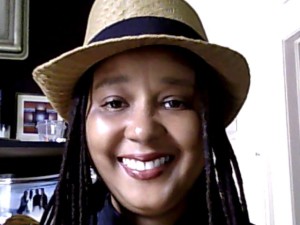
Vanessa Jackson, activist/soul doula/therapist.
There are other African American women speaking out against the Murphy Bill. Vanessa Jackson, an activist/soul doula/therapist working her magic in Atlanta, Georgia says, “It is very important to stress the way that these laws disproportionately impact people of color. Getting swooped up for behavior unbecoming Black people is a well-established tradition in the mental health field. It is another way to police black bodies without addressing the external factors — racism, economic inequity, violence, lack of affordable housing and continuous traumatic stress disorder — which contribute to our emotional distress.” (You can learn more about Vanessa’s work at www.healingcircles.org)
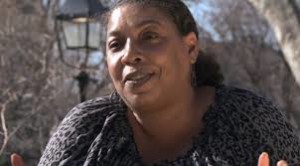
Celia Brown, President of the Board of Directors of MindFreedom International.
Celia Brown, President of the MindFreedom International Board of Directors says, “In Solidarity with #blacklivesmatter: African-Americans experience emotional distress, trauma and psychiatric oppression due to institutional racism. As a psychiatric survivor and African-American woman, I understand that African-Americans live daily with the threat or experience of psychiatric profiling, racial profiling, losing our lives due to police brutality, mass incarceration, poverty, involuntary psychiatric treatment, harmful mental health practices and psychiatric drugging. Racism chips away at the emotional well-being of the African-American community.”
In the United States, prisons are serving as de facto “treatment” facilities that warehouse and exploit the labor of a population that is disproportionately black and working class. Today, women are the fastest growing population of people being imprisoned. Historically, men have been incarcerated and women have been institutionalized in equally violent insane asylums. As the racist prison-industrial complex expands, so does the mistreatment of people experiencing mental and emotional duress. In fact, the system is designed to silence and invisibilize people that we, collectively, deem problems that we cannot solve.
Murphy suggests that his bill is a solution to the issue of people diagnosed with a psychiatric disorder or experiencing mental and emotional distress in prison, but we know that “Assisted Outpatient Treatment” is not a good solution. In reality, it is court-ordered Involuntary Outpatient Commitment. It’s just one more tactic of surveillance, control and domination — the newest manifestation of the insane asylum, the penitentiary, the private prison. In response to H.R. 3717, the original bill proposed, the Bazelon Center says, “Rep. Tim Murphy’s (R-PA) mental health legislation flies in the face of the federal government’s efforts to promote community integration, and would send mental health systems decades backward. H.R. 3717 would destroy the main system of legal representation for Americans with psychiatric disabilities, would strip away privacy rights, would incentivize needless hospitalization and civil rights violations, and would redirect federal funds from effective, voluntary community services to high-cost, forced treatment, including involuntary outpatient commitment.”
Murphy’s bill is part of the story of centuries of racism and psychiatry unfolding in the United States.
Here is a very, very, very incomplete history of racism, psychiatry, and the USA:
- 1792: Benjamin Rush, largely referred to as “the father of American psychiatry,” argued that the “color” and “figure” of African-Americans were derived from a form of leprosy, and he argued that with proper treatment, they could be cured and become white. Rush used the term “negritude,” popular at the time, to refer to the disease of blackness.
- 1851: Drapetomania was a supposed mental illness described by American physician Samuel A. Cartwright that caused black slaves to flee captivity.
- 1961: Black activist, musician and lawyer, Paul Robeson, is administered electroshock and excessive doses of multiple barbiturates with no psychotherapy.
- 1967: Mark, Sweet and Ervin argue that brain disease plays a role in African American political resistance and suggest that lobotomy may be a solution to rioting.
- 1984: Reagan admits to CIA involvement in the Introduction of crack cocaine to LA. (See the 2015 documentary Freeway: Crack in the System.)
- Late 1980’s: Nina Simone is given the label “bipolar,” institutionalized and administered forced, unauthorized drugging.
- 1992: The Alcohol, Drug Abuse, and Mental Health Administration unleashed its “violence initiative,” which sought a genetic basis for criminal behavior. ADAMHA director Frederick Goodwin compared the “high-impact inner city” to a jungle and its youth to rhesus monkeys who only want to kill one another, have sex and reproduce. By focusing on “biologically vulnerable” youth for psychiatric interventions, including drug treatments, the initiative was essentially depoliticizing as it de-emphasized social explanations for crime.
- 1994: NAACP speaks out about the fact that minority boys are 11 times more likely than the general student population to be administered mind-altering drugs.
- 2005: One of the main statistical reports about involuntary psychiatric drugging using court orders for people living at home out living in the community was published this year by New York State. The data reveals that African Americans are far more likely be on the receiving end of such outpatient forced drugging. The report stated that, “The racial and ethnic composition of the population receiving court-ordered treatment is diverse: 42% of AOT recipients are Black, 34% are White and 21% are Hispanic.”
(For a more elaborate history, see page 5 of the report linked in the resource list below.)
So-called “mentally ill” people are not our greatest dangers
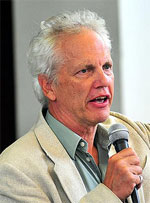
Dan Fisher, National Empowerment Center.
Once again, more gun violence is in the spotlight in the USA. At first, it would seem to make sense to think that mental health has the answer. But as Dan Fisher, MD, PhD, and Director of Emotional CPR at the National Empowerment Center points out, “Rep. Timothy Murphy has proposed legislation, HR 2646, which would increase forced psychiatric treatment in our own homes out in the community, and institutionalization of persons with mental health conditions. This legislation is based on the false premise that persons with mental health conditions are more likely to carry out gun violence than the general population. In fact, persons with mental health conditions only account for 4% of gun related homicides and yet account for 20% of the population.”
The solution to gun violence that we are hearing is often from people who call for small government. However, forcing people in their own homes to take powerful psychiatric may be one of the worst examples of government gone out of control. Incredibly, there are two examples from Minnesota where court orders for psychiatric care have meant that individuals living at home have been required to report to a nearby hospital to receive forced outpatient electroshock against their wills: Ray Sandford and Elizabeth Ellis.
Murphy’s Bill would make people’s bedrooms into cells and would make their homes into wards. Can you imagine turning psychiatrists into parole officers?
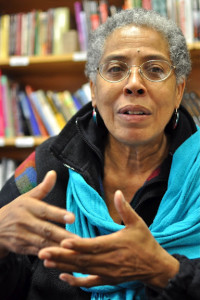
Cindi Fisher, activist and mother of a psychiatric survivor in Washington State.
This debate about mental health may seem theoretical, but it can have real life consequences in families’ lives that can lead to a great deal of suffering. One of the mothers of a psychiatric survivor to speak out is an African American woman, Cindi Fisher.
She described having her son receive forced psychiatric drugging for almost two decades, rather than real help: “Following the overdosing, within eight months, after stopping and starting the psychotic drug, over and over again in an attempt to relieve his torment and agony, he experienced a medical crisis and made a desperate attempt to get someone to call 9-1-1. This act was criminalized and was the beginning of a 19-year vicious cycle of being drugged and criminalized, jailed or forced hospitalized, released into the community without real treatment, and criminalized and drugged again. These treatments have caused a significant decline in his cognitive functioning; a loss of his love of music, and dancing, as well as made him an insulin dependent diabetic; dependent on high blood pressure medication and caused a critically enlarged growth on his thyroid gland.”
Take action to stop the racist Murphy bill!
We ought to all take action against the Murphy bill, which is getting many sponsors in Congress. Please ask US Representatives to send some questions to Representative Tim Murphy (R-PA) about his bill H.R. 2646. This is called a “constituent inquiry” and is done frequently; the other congressperson often feels like they need to respond. Here are some questions you can ask:
- How many Americans do you feel should be court ordered to receive psychiatric care?
- How many more Americans would receive involuntary psychiatric procedures under your bill?
- Would involuntary psychiatric drugs, and even occasional electroshock, be court ordered to Americans living in their own home out in the community under your bill?
- Have you engaged in dialogue with the major groups representing USA mental health consumers and psychiatric survivors that are all opposed to your bill?
- How will you address the disproportionate impact that your bill will have on People of Color?
In addition to talking to your representative, we also encourage you to check out and contribute to the conversation happening on Twitter at #BlackLivesMatter
We say, #BlackLivesMatter! Spread the word.
================================
Resources to Stop the Murphy Bill and Connect with the Mad Movement:
This note is to provide acknowledge and thanks to Adrienne Bovee who worked so hard on this entry for months. Adrienne is truly a powerful, young, courageous worker for justice in prison, psychiatric, race and many other issues!
This blog entry was originally posted at http://davidwoaks.org, and is protected by the Creative Commons (attribution, not-commercial). This entry is rebroadcast by Mad In America here: http://www.madinamerica.com/author/doaks/
Read More


